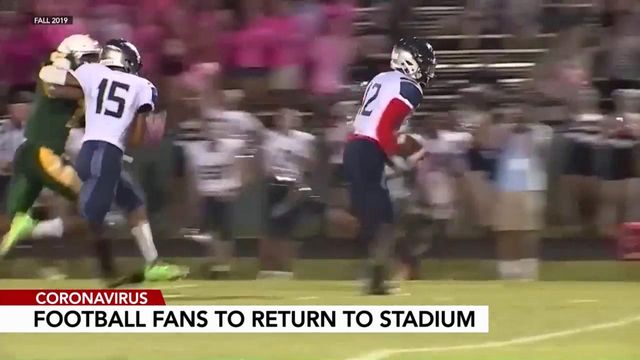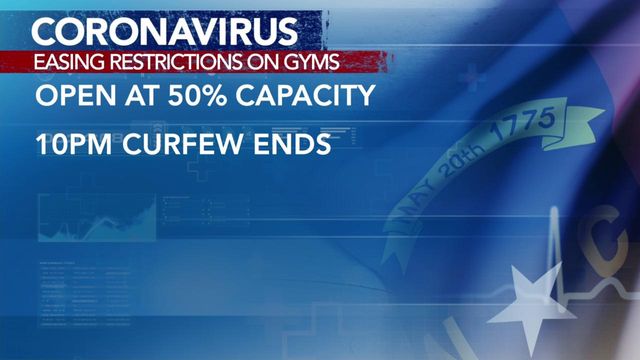NC curfew ending; restrictions loosened to allow more people at bars, gyms, sporting events
Coronavirus trends in North Carolina have improved so much in recent weeks that Gov. Roy Cooper said Wednesday that a nightly curfew designed to limit the spread of the virus will end Friday.
Posted — UpdatedCooper also is easing other pandemic-related restrictions, such as allowing bars to seat customers indoors for the first time in almost a year and allowing more fans at entertainment and sporting events.
"Today's action is a show of confidence and trust, but we must remain cautious," the governor said in an afternoon briefing. "Now is the time to put our strength and resiliency to work so we can continue to turn the corner and get through this pandemic."
The curfew requires most businesses to close at 10 p.m., although restaurants can continue to fill takeout and delivery orders after that time.
Alcohol sales for on-site consumption also have had to halt at 9 p.m. under the curfew, but Cooper said that will be pushed back to 11 p.m. when his new executive order goes into effect at 5 p.m. Friday.
North Carolina surpassed 11,000 deaths during the pandemic on Wednesday, but the daily averages for new infections and people hospitalized with COVID-19 have been trending downward for more than a month, following spikes related to the Christmas and New Year’s holidays.
"North Carolina's trends have declined and stabilized," Cooper said. "Fewer people are getting sick, and fewer are needing hospitals."
Providers also have administered almost 2.2 million vaccinations statewide in the past two months, meaning 13 percent of North Carolinians have received at least one dose of the two-shot regimen and 7.7 percent are fully vaccinated.
Bars have been especially hard hit during the pandemic, forced to close for months and then allowed to serve only a limited number of people in outdoor areas.
Under the eased restrictions, Cooper said, bars will be allowed to reopen at 30 percent of indoor capacity, with a cap of 250 people.
Zack Medford, a Raleigh bar owner and president of the North Carolina Bar and Tavern Association, has repeatedly criticized Cooper's restrictions for months. He called the ability for bars to start serving drinks indoors again a "huge, hard-fought win."
"The lessening of these restrictions would never have been possible without the tireless efforts of NCBATA members and allies for the past 343 days. We look forward to continuing to build on this success with the Governor’s Office and helping get our bars and taverns back on their feet after such a devastating year," Medford said in a statement.
Cooper defended his restrictions, saying many people have been "taking themselves out of commerce and retail" during the pandemic out of concern for their own safety. Limiting the spread of the virus until more people can get vaccinated is the best way to boost the economy, he said.
As with bars, limits on attendance at gyms and entertainment and sporting events are being eased.
Gyms will be able to expand from 30 to 50 percent capacity.
Outdoor sports and entertainment venues no longer have a 100-person cap and can have up to 30 percent capacity, while indoor venues, including high schools, can have up to 250 people or 30 percent of capacity, whichever is less. Indoor arenas that seat more than 5,000 can have up 15 percent of capacity.
Don Waddell, president and general manager of the Carolina Hurricanes, said hockey fans should be able to start attending games at PNC Arena in Raleigh on March 4.
"The Caniacs are the backbone of our franchise, and we are thrilled to welcome them back to PNC Arena,” Waddell said in a statement. “Our staff has worked extremely hard to put protocols in place to protect the health and safety of our fans, as well as our players and staff."
"This has been a difficult year, and we know that the limitations have had particularly harsh effects on student-athletes and their families," Que Tucker, commissioner of the North Carolina High School Athletic Association, said in a statement. "We are ready to allow some sense of normalcy for these groups and thankful that we have reached this point as a state. However, we want to do our part to make sure that this step forward does not lead to a step backwards. Simply put, we cannot afford further setbacks."
Cooper said the statewide mask mandate and mass gathering limits will remain in place to reduce the likelihood of such setbacks as more people gather with the eased restrictions. The indoor limit has been increased from 10 to 25 people, while the outdoor limit remains at 50.
"As more people get together, it will become more vital," he said. "We're still in the middle of a pandemic. We still have a virus that is very contagious."
Dr. Mandy Cohen, secretary of the state Department of Health and Human Services, also noted highly contagious coronavirus variants are "a wildcard" in battling the pandemic.
"We'll do what we need to do," Cooper said when asked if restrictions would be reimposed if variants produce a new surge in cases.
Even with more people allowed to gather at more places indoors, the governor and Cohen both recommended that people continue to work remotely, if possible, including state employees.
"If you can get your work done and get it done remotely, that's a better situation than having a lot of people in an office setting," Cooper said.
Cohen noted that two-thirds of the state still has critical or substantial levels of viral spread, so everyone needs to keep their guard up in as many situations as possible.
Related Topics
• Credits
Copyright 2024 by Capitol Broadcasting Company. All rights reserved. This material may not be published, broadcast, rewritten or redistributed.






